Queen Liliuokalani: Royal Prisoner Read online
Page 9
“Our parents,” Maisie said, “they got divorced. And this whole year all I wanted was my old life back. I know it’s different,” she continued, embarrassed, “but I know a little bit what it feels like to try to hold on to a way of life.”
Felix said, “To hold on when, really, everything is changing.”
Liliu looked at them, her face solemn.
“Don’t let go,” she said. “Always remember the old ways, and what you’ve lost. If you don’t keep it alive, who will?”
Maisie nudged Felix with her elbow.
“Right,” he said.
He pulled the crown from his pocket.
“We brought this for you,” he told Liliu.
“It’s beautiful!” she said, taking it and turning it around and around in her hands. “But why are you giving it to me?”
Maisie and Felix looked at each other.
“It’s yours,” Felix said finally.
Maisie had a strong urge to hug Liliu, but just as she reached her arms out toward her, she and Felix were lifted into the air. And even before they were aware of the smells and sounds around them, they knew: They were going back.
CHAPTER 11
The Shard
“You guys still awake?” their father was asking from the doorway.
Maisie and Felix looked at each other.
“Uh…yeah,” Maisie managed to answer.
“Want some ice cream?” their father said.
Felix couldn’t answer. He was still seeing Liliu’s face, her braids hanging down her back, the sky behind her still smoky from the fireworks. He was still smelling the hibiscuses and orange blossoms and orchids.
“Sure,” he heard Maisie say.
“Come on out to the kitchen,” their father told them.
He was looking at them oddly.
“Are you two up to something?” he asked.
That was exactly what Mom would say, Felix thought. And that thought made him almost cry. Why couldn’t his parents see how alike they were? How right they were for each other?
His parents had gotten married at City Hall with a small group of friends by their side. They had an ivory photo album filled with snapshots, his mother wearing a white shift dress, grinning up at his father, who stood beside her in his trademark blue jeans and a white button-down shirt with a brightly colored tie. They looked happy in those pictures, Felix always thought. It was a sunny June day, and his mother clutched a fat bouquet of yellow sunflowers. After the ceremony, the wedding party had gone to Chinatown and eaten themselves silly at Wo Hop. There were pictures of that, too: his parents holding chopsticks and feeding each other broccoli and dumplings; opening a bottle of champagne, the foam dripping down his father’s hand; his father’s arm casually draped over his mother’s shoulder as he made a toast. In all of them, there was no sign that their love would ever end, that they would get divorced and find new people to love.
In the kitchen, their father pulled out cartons of ice cream: Cherry Garcia and Phish Food and New York Super Fudge Chunk.
“Why so glum?” he asked them.
Felix just shook his head.
But Maisie said, “We miss us.”
“Us?”
She nodded. “Our family. Us.”
Their father scooped a ball of each flavor into the bowls. That’s how they did it in their family.
“So do I,” he said at last. “So do I.”
The next morning, Maisie and Felix had to go back to Newport. They kind of wished that Agatha the Great wouldn’t be there for breakfast with them and their father, but she was. She arrived fresh from Pilates, her hair in a ponytail, and a purple yoga mat sticking out of her oversize bag.
They had asked their father if they could have their last breakfast of the trip together at the Bus Stop Cafe, the very ordinary diner on the corner of Hudson and Bethune Street, where they used to go for grilled cheese sandwiches on lazy afternoons, or plain old bacon and eggs on mornings when they ran out of milk or just felt like having someone else scramble the eggs. You really want to go there? their father had asked. He’d offered them all kinds of special breakfasts—knishes at Schimmel’s, Goldilocks omelets at Sarabeth’s, dim sum in Chinatown—but the only breakfast Maisie and Felix wanted was at the Bus Stop Cafe.
“Isn’t this cute?” Agatha said when she arrived.
Maisie noticed how she squeezed their father’s hand and bumped her shoulder against his.
“It’s not cute,” Felix said. “It’s just regular.”
“Okay,” Agatha said, giving their father a look that neither Maisie nor Felix could read.
“The coffee is pretty bad,” their father warned her.
“No,” Maisie reminded him. “It’s not bad. It’s serviceable.”
That’s what he always used to say. The coffee isn’t terrible, Jenny. It’s serviceable. And their mother would wrinkle her nose and take a sip and say, You are absolutely right, Jake. This is a cup of serviceable coffee.
“Okay,” Agatha said again.
Their father took a swallow of coffee and nodded.
“Thank you for reminding me, kiddos. This is indeed serviceable coffee.”
“Inside joke, I guess,” Agatha said.
They ordered. Egg-white omelet for Agatha. Bacon and eggs for the three of them. With white toast. Their mother always said that the only thing white bread was good for was toast.
“So,” their father said as he mopped up the last of his egg with the last of his toast.
Maisie’s stomach rolled. Something about the way he said so let her know he was about to make an announcement. She hadn’t heard a good announcement in almost a year, ever since that day when her parents told her and Felix they were getting divorced.
“What would you two say if I told you I was moving back to the States?” her father said.
Maisie shook her head as if to clear out any interference. If her father was leaving Qatar and moving back, then this was a very good announcement.
“I would say great,” Felix said.
“Then I guess you need to say great,” their father said, beaming.
“Great!” Felix said, so happy he thought his chest might burst.
Then their father draped his arm around Agatha’s shoulders, the way he did with their mother in the wedding album.
“And what would you say if I told you that Agatha and I are going to get married?” he asked.
Agatha was grinning and their father was grinning, but Maisie and Felix’s expressions had turned to stone.
“That’s great, too, isn’t it?” Agatha said, her voice so cheerful that Felix thought he might actually cry.
“It is great,” their father said, filling the silence Maisie and Felix had left. “I’m going to rent a studio downtown again and get back to painting, and Agatha will work at a gallery…”
The sound of his voice spinning all the plans he and Agatha had made turned into an annoying buzz in Maisie and Felix’s heads. Felix thought of Liliu, standing on that wide lawn beneath all those stars. It was their job, she’d said, to hold on to all the past had given them. How easy it was, Felix thought, to throw it away.
Soon they were on the subway to Penn Station, Agatha talking about places where they might get married and their father grinning and saying Isn’t that great? about everything.
And then they were on the platform at Penn Station, the train chugging noisily to a stop. Their father easily carried both of their bags onto the train, and settled them into seats on the right-hand side so that they’d be sure to have a view of the ocean when they passed through Connecticut.
And then he was kissing them both good-bye, murmuring about how by June he would be living in New York City again and they could come to visit him all the time, maybe even for the whole summer.
And then he was gone and the train was pulling away. Maisie and Felix looked out the window and found their father standing on the platform, his arm around Agatha, both of them waving good-bye.
Felix picked up
the book Jim Duncan had given him. Moby-Dick. He stared down at the cover. There, beneath the title, was the author’s name: Herman Melville.
“Maisie,” Felix said, holding up the book. “Herman Melville.”
“The guy who hid us from Gold Tooth?” she said.
Felix nodded. You never knew about people, he thought, opening the book.
Back at home, it seemed nothing had changed.
The Treasure Chest remained sealed. Great-Uncle Thorne spent all his time with Penelope Merriweather, and their mother spent all her time either at work or with Bruce Fishbaum.
School started up again, uneventfully.
The entire sixth grade, both Miss Landers’s and Mrs. Witherspoon’s classes, had to choose topics for research papers.
Felix decided on his immediately: whaling in the nineteenth century.
Maisie chose hers right away, too: the Kingdom of Hawaii.
“What are you doing yours on?” Felix asked Lily Goldberg at lunch that day.
The spring air still had a chill to it, but the sun was bright and the leaves shimmered a beautiful green beneath it. Felix and Lily had taken their lunches outside to eat.
“I’m not doing one,” she said.
Lily Goldberg looked especially pretty today, Felix thought. Her dress had a pattern of apples and pears, and her hair was poking out at funny angles.
“You have to do one,” he told her.
He was going to tell her about scrimshaw and Nantucket sleigh rides and widow’s walks, but the way she was looking at him made him pause.
“I’m moving,” she announced flatly. “To Cleveland, Ohio.”
To Felix, Cleveland, Ohio, was as far away as South Dakota or Hawaii. Too many miles separated it from Newport, Rhode Island.
“Oh,” he said, because that was the only word that managed to escape his throat.
“My father got transferred,” she said.
“Oh,” Felix said again.
They sat silently, side by side, Felix chewing his turkey sandwich, and Lily munching on slices of pepperoni.
“I’m going to miss you,” Felix said finally, a familiar ache growing in his gut, the one that came with bad news: his parents’ divorce, the move here, Great-Aunt Maisie’s death.
Lily Goldberg stared straight ahead.
“I’m going to miss you, too,” she said.
Felix saw a tear in the corner of her eye.
“We’ll e-mail all the time,” he said.
“People always say things like that,” Lily said. “But they don’t really do it.”
“It’s up to us to do it,” Felix said. He thought about Liliu and added, “If we don’t keep the past alive, who will?”
Lily finally turned to him. She grinned, her breath all spicy and pepperoni-smelling.
“You’re so weird,” she said, and squeezed his hand.
After dinner that night, Great-Uncle Thorne cornered Maisie and Felix in the Library.
Spread out on the table Phinneas Pickworth had brought back from Morocco was a map of a whaling route through the South Seas, the CliffsNotes on Moby-Dick, and photocopied pictures of whaling ships. Felix had circled one of them—the ship with the name Gloria Jenny on its side. Maisie sat curled up on the sofa that Great-Uncle Thorne called a divan, reading the book Hawaii’s Story by Hawaii’s Queen.
“How did you do it?” Great-Uncle Thorne demanded.
Felix, glum from Lily’s news, wanted nothing less than to have to listen to Great-Uncle Thorne.
“Do what?” Felix said. “We’re working on our research papers.”
“Poppycock!” Great-Uncle Thorne bellowed. “Don’t play innocent with me! My bones don’t ache, my arthritis is gone, and my appetite is enormous.”
He glared at them from beneath his impressive white eyebrows.
“In other words,” he said, “you got into The Treasure Chest.”
“No, we didn’t,” Maisie said without even bothering to look up from her book.
Great-Uncle Thorne waved his jade-tipped walking stick in the air.
“You two time traveled!” he boomed. “My beloved is over one hundred years old. Do you think I want to lose her? Do you think I want to watch her wither away?”
They didn’t respond.
“It’s a waste,” Great-Uncle Thorne muttered. “You two don’t appreciate it. You don’t even use it correctly.”
“That’s what you think,” Maisie said, placing a finger in her book to hold her place. “You told me about lame demon and we used it, just like you said.”
“We said it and got lifted into this tornado thing, and then we landed right where we were supposed to,” Felix told him.
“And it rescued us when we got into a pickle,” Maisie added.
“But how did you get into The Treasure Chest?” Great-Uncle Thorne said, furrowing those impressive white eyebrows.
“We didn’t have to get inside,” Maisie said. “I took an object out and we used it.”
“Aha! You little…little…ruffian! Do you have other objects?”
“No,” Maisie admitted.
Great-Uncle Thorne stared at them hard.
“I’m not sure I believe you,” he said.
Maisie opened her book again and started to read. But she couldn’t concentrate, not with Great-Uncle Thorne standing there huffing and puffing.
“I want the shard,” he said.
“What?” Felix asked, surprised.
“No way,” Maisie said.
“I can’t trust you two,” Great-Uncle Thorne said. “The only way I can be sure you stay put is to take the shard.”
“We’re not going to give it to you,” Maisie said.
“You…” Great-Uncle Thorne shook his fists at her in frustration. “You imbeciles! You don’t even know what the shard can do. The Treasure Chest is wasted on the likes of you two.”
“Why don’t you tell us then?” Felix asked Great-Uncle Thorne.
Great-Uncle Thorne laughed.
“It’s almost worth reopening The Treasure Chest just to watch you flail about,” he said.
He grew serious again.
“Almost,” he said. “But not quite.”
With that, he strode out of the Library.
Maisie and Felix watched him disappear, then looked at each other.
“The shard?” Felix said.
Maisie held it up so they both could examine it.
“What in the world can this little piece of porcelain possibly do?” she wondered out loud.
The wind seemed to grow stronger, rattling the windows and whistling through the trees.
In a way, Felix hoped Great-Uncle Thorne wouldn’t unseal The Treasure Chest.
In a way, Maisie hoped he would.
Liliu Kamakaeha, later known as Queen Liliuokalani, was born on September 2, 1838, in a grass thatched-roof hut at the base of Punchbowl Hill on the island of Oahu in Hawaii. The hut was the largest one in a high chief’s compound. Her mother, Keohokãlole, was the descendant of high chiefs, and her family of court chanters and composers awaited the birth of her third child by telling of the impressive family’s genealogy and deeds. Liliu’s father, High Chief Kapa‘akea, came from a family of mostly warriors.
The birth of an ali‘i, or royalty, was believed to be accompanied by the heavens sending a signal, such as thunder, lightning, or rain. But the day of Liliu’s birth proved to be unrelentingly hot and inauspicious until the moment of her birth, when it was reported that a cry came from inside the hut at the same time that one came from outside. The cry from inside announced the quick birth of Liliu; the cry from outside came when, after a few drops of rain fell, a rainbow appeared in the sky, a fitting signal of the birth of an ali‘i—already promised as the hanai, or adopted daughter, to the granddaughter of King Kamehameha I—and of a baby who would grow up to become the last queen of Hawaii.
When Liliu was born, Hawaii consisted of a kingdom of eight islands ruled by Kamehameha III. In 1778, when Captain James Co
ok first sailed into Hawaii, there was a population of three hundred thousand on the islands. White settlers brought new diseases like measles and smallpox with them, and by 1838 the population had dwindled to only forty thousand. Eighteen years earlier, missionaries had arrived with the intention of converting the Hawaiians, who believed in many gods, into Christians.
Liliu was born at an important time in Hawaiian history. Great Britain and the United States were turning their attention to the islands and planning to take control of them. The missionaries were beginning to make progress in converting Hawaiians. And sugar was becoming an important and lucrative export, which led to foreigners running sugar plantations there.
Like many of the royal children, Liliu was given a Christian name, and she was known as Lydia as a child. At the age of four, she was sent to the Chiefs’ Children’s School, a boarding school for the royal children and the children of high chiefs. There, she learned to read and write in English. In her first year at the school, 1843, Hawaii fell under British rule. Although on July 31 of the same year Hawaiian independence was restored, the kingdom’s fragility became even more pronounced. For the next four years, Restoration Day was celebrated with much fanfare. But then, in 1848, more changes came to Hawaii.
Although Hawaiian royalty still sat on the throne, Hawaii was now controlled by missionaries and foreign businessmen. The language, the money, the newspaper, the teachers, and the business owners were all becoming increasingly American. Liliu, like many of the princes, became anti-American and was strongly opposed to the annexation of Hawaii to America. Although some of the royal princes leaned toward British rule, Liliu wanted a Hawaii for Hawaiians. However, after Kamehameha III died in 1854, Prince Liholiho was named Kamehameha IV, and he favored British control of Hawaii.
Liliu began to see the plight of her people. In an effort to battle the diseases that were killing so many native Hawaiians, she went door-to-door raising money to build a hospital in Honolulu. In addition, she became an active member of the Kaahumanu Society, an organization made up of high chiefesses who wanted to preserve Hawaiian traditions and culture as well as fortify the strength of its women, who were losing more and more power in a British-influenced government.

 Kitchen Yarns
Kitchen Yarns Waiting to Vanish
Waiting to Vanish Morningstar
Morningstar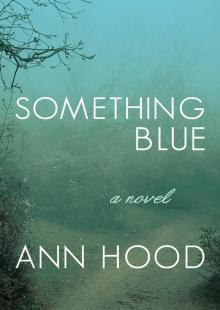 Something Blue
Something Blue Providence Noir
Providence Noir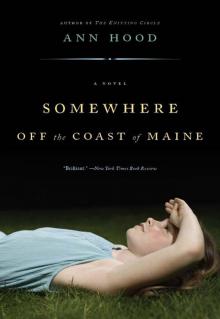 Somewhere Off the Coast of Maine
Somewhere Off the Coast of Maine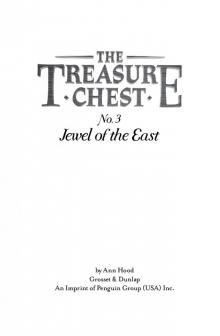 Jewel of the East
Jewel of the East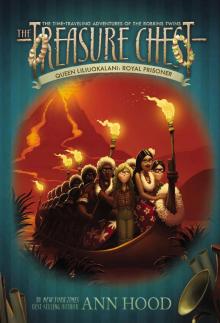 Queen Liliuokalani: Royal Prisoner
Queen Liliuokalani: Royal Prisoner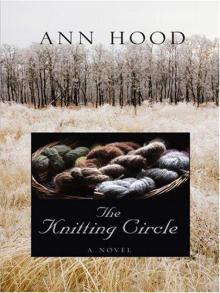 The Knitting Circle
The Knitting Circle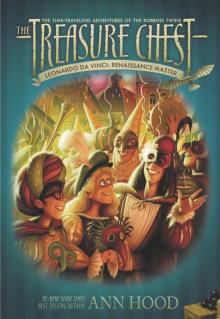 Leonardo da Vinci: Renaissance Master
Leonardo da Vinci: Renaissance Master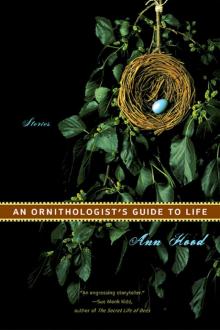 An Ornithologist's Guide to Life
An Ornithologist's Guide to Life The Red Thread
The Red Thread She Loves You (Yeah, Yeah, Yeah)
She Loves You (Yeah, Yeah, Yeah)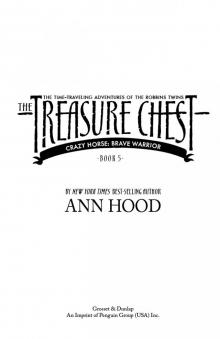 Brave Warrior
Brave Warrior How I Saved My Father's Life (and Ruined Everything Else)
How I Saved My Father's Life (and Ruined Everything Else) An Italian Wife
An Italian Wife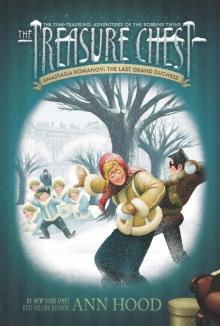 Anastasia Romanov: The Last Grand Duchess #10
Anastasia Romanov: The Last Grand Duchess #10 Prince of Air
Prince of Air Amelia Earhart: Lady Lindy
Amelia Earhart: Lady Lindy Places to Stay the Night
Places to Stay the Night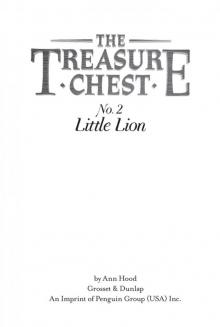 Little Lion
Little Lion Comfort
Comfort Angel of the Battlefield
Angel of the Battlefield